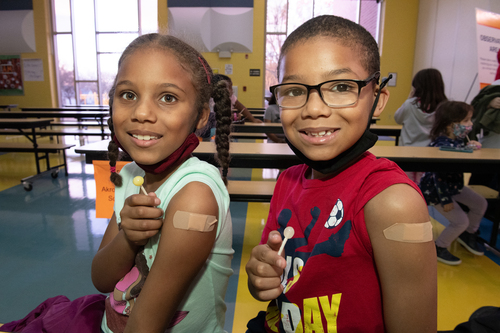
For many years, Akron Children’s has contracted with school districts throughout Northeast Ohio to provide health services in local schools to address minor medical issues, as well as oversee the ongoing health needs of children who have chronic conditions, like asthma and diabetes, and those who are medically complex (ventilator-dependent or require tube feedings).
In 2019, school-based health services piloted a school-based health center and hired a nurse practitioner to provide cost-effective care for children who lack access to it by offering preventive care screenings and appointments to diagnose and treat minor illnesses.
Michele Wilmoth, director of school health services, says an asset of the program is the school health team’s established relationships with students and families in their districts.
“A lot of children come to school sick because their families have no other options,” she says. “They may lack transportation or have workplace policies that may make it difficult for them to leave their jobs to get their children to the doctor.”
When it became clear that one nurse practitioner was no longer able to meet the growing demands for services, Michele and her team wrote a grant proposal in hopes of expanding the program. In March, the Ohio Department of Health awarded Akron Children’s a $3.9 million grant.
The grant money will allow Akron Children’s to expand its school-based health centers in districts already onboard: Akron Public Schools, Windham Exempted Village Schools, Sebring Local Schools, East Palestine City School District, and Warren City Schools.

Michele Wilmoth, director of school-based health services (pictured left) and Teresa Fletcher, nurse practitioner (right)
Using this model, an Akron Children’s nurse practitioner, working with school nurses and other team members, is able to:
- Diagnose a child with a minor illness in person or by telehealth, with parent permission, and arrange for a prescription to be ordered without the child having to leave school or a parent having to leave work.
- Connect a family to a pediatric medical home and other community resources.
- Help manage students with chronic illnesses.
- Help diagnose a behavioral health concern and refer the family to a specialist.
- Offer vision and hearing screenings.
- Provide a well-child exam and immunizations in a private location within the school nursing office for a child behind on preventative care due to the pandemic, a residential move or other reasons.
In addition to hiring more staff, the grant money will allow Akron Children’s to purchase telehealth equipment for each school building. Using this state-of-the-art equipment, the nurse practitioner can hear heart and lung sounds, and see in a child’s ear, nose and throat for a full exam even if she is not physically present in the building where the student is sick.
“These clinics remove many of the barriers that prevent families from getting health care for their children,” says Michele. “In addition, they keep children in school whenever possible and that continuity is a key factor in their academic success.”
According to Teresa Fletcher, one of the nurse practitioners in the school-based health center, “The goal is to begin treatment for minor illnesses immediately in hopes of reducing missed school days for students and missed workdays for their parents. My role is also to help identify what other factors may be going on in a student’s home that could be preventing them from getting regular health care.”
Teresa and the other nurse practitioners will conduct health needs assessments to help families connect with social service agencies within their communities for help with things like food and housing, transportation and behavioral health services.
Research has shown that school-based health centers work. At-risk students are receiving more well-child evaluations and immunizations and are using emergency rooms less for their day-to-day health care.
“We hope our efforts to deliver preventive care in schools can help reduce absenteeism and promote better learning,” says Teresa.










